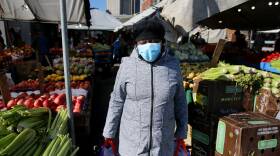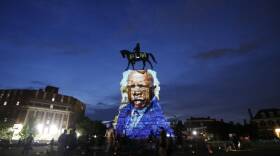EXPLORE MORE
Coming up Monday on BPR:
Mas GOP chair Amy Carnevale and Mass Dems chair Steve Kerrigan
Ali Noorani of the Barr Foundation
Princeton’s Khalil Gibran Muhammad
Recent segments
-
Singer-Songwriter Lori McKenna Talks “The Balladeer" and Her Love for Kitchen Conversations
The Grammy Award-winner will be performing a livestream concert on Friday evening at Club Passim. -
Emily Rooney: Wearing A Mask Shouldn't Be A Political Issue
Massachusetts guidelines advise people to wear face coverings, even outside, if they cannot keep their distance from others. Not everyone is doing that. -
Callie Crossley On The Re-purposing Of A Confederate Statue
"It's really become a gathering space. I thought wow, what a way to reinvent in the moment," Crossley said. -
Corby Kummer: Trader Joe's Is 'Finally Saying No To Racist Branding'
Trader Joe's follows in the steps of Aunt Jemima and Uncle Ben's in removing branding critics say is racist. -
Rep. Joe Kennedy On Delay To Senate Republican COVID Relief Proposal: 'It’s Really Dangerous News For Our Country'
The congressman said further federal relief is critical to support struggling families and educators, and to bolster coronavirus testing capabilities. -
Ali Noorani On President Trump's Call To Exclude Undocumented Immigrants From The Census
The census has historically counted everyone, regardless of citizenship or legal status.
Listen to previous shows
-

Best Of BPR 11/21: Lyndia Downie & AITA Thanksgiving Edition
Best Of BPR 11/21: Lyndia Downie & AITA Thanksgiving Edition -

-

BPR Full Show 11/20: Tokin' at the Turkey Table
BPR Full Show 11/20: Tokin' at the Turkey Table -

Best Of BPR 11/17: Cherry Street Music & Jacques Pepin
Best Of BPR 11/17: Cherry Street Music & Jacques Pepin -

BPR Full Show 11/17: A Broccolini Thanksgiving
BPR Full Show 11/17: A Broccolini Thanksgiving









